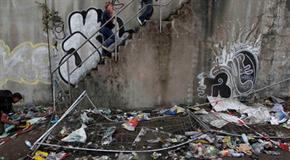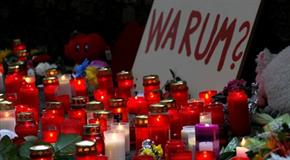Features
Death Toll From German Music Festival Rises

The tragedy shocked the nation and dominated news coverage on Sunday. Many were wondering how such a tragedy could occur in a country that in recent years has organized much bigger events, such as the World Cup four years ago, that went off smoothly.
This year’s organizer of the Love Parade said the event – which was held this year for two decades now – would never be held again.
“The Love Parade was always a peaceful event and a happy party” but would forever be overshadowed by the tragedy, Rainer Schaller said.
“It’s over for the Love Parade,” he said.
He spoke at a press conference where authorities faced tough questions, but provided few details, about why up to hundreds of thousands of people were funneled through a single highway underpass onto the grounds of former freight railway station used to host the party.
Rainer Wendt, leader of a major German police union, told the Bild daily that his group warned a year ago in vain that Duisburg was an unacceptable location for the Love Parade.
“The city is too narrow, too small to manage the masses of people,” Wendt was quoted as saying by Bild’s website. He said the blame rests with the city mayor and the Love Parade organizers.
The founder of the Love Parade, Matthias Roeingh – generally known by his artist’s name, Dr. Motte – blamed this year’s organizers, saying “one single entrance through a tunnel lends itself to disaster. I am very sad.”
German media reported that there were at least 1.4 million people but police did not confirm that estimate. They said they have no exact figure but suggested that it was much lower based on the fact that the railway service registered 105,000 as arriving in the city by train in the preceding hours.
Detlef von Schmeling, the police chief in Duisburg, said that 16 of the 19 people killed have been identified so far. He said they include four foreigners – an Australian, an Italian, a Chinese citizen and a person from Holland.
Von Schmeling said their ages ranged from just over 20 to 40.

Witnesses said officers in Duisburg, a city near Duesseldorf in western Germany, closed the end of the tunnel emptying onto the festival grounds after they become overcrowded around 5 p.m. They told revelers over loudspeakers to turn around and walk back in the other direction. But the entrance to the tunnel did not appear to have been closed and people continued piling in, sparking a panic and then a deadly crush.
Witnesses described a desperate scene, as people piled up on each other or scrambled over others who had fallen. TV images showed huge masses of people packed inside the wide tunnel and people struggling to escape up an embankment when the chaos broke out.
Partygoer Udo Sandhoefer told n-tv television that even though no one else was being let in, people still streamed into the tunnel, causing “a real mass panic.”
“At some point the column (of people) got stuck, probably because everything was closed up front, and we saw that the first people were already lying on the ground,” he said.
City officials chose not to evacuate the site, fearing it might spark more panic, and many people continued partying, unaware of the deaths.Rescue workers carried away the injured as techno music thundered in the background.
Other workers had trouble getting to the victims, hampered by the huge crowds. Local media reported that the cell phone system in Duisburg broke down temporarily and frantic parents trying to reach their children instead drove to the scene to look for them.
However, most streets downtown were blocked by police and the highways leading to the city were jammed. Several media outlets also reported that rescue helicopters had problems taking away the heavily injured because there was not enough space for them to land.
German leaders, including Chancellor Angela Merkel, voiced shock that an event meant to celebrate youth, peace and love could turn so deadly.
“The young people came to celebrate and instead there are dead and injured,” Merkel said Saturday. “I am horrified by the suffering and the pain.”
It was the worst accident of its kind since nine people were crushed to death and 43 more were injured at a rock festival in Roskilde, Denmark, in 2000. That fatal accident occurred when a huge crowd pushed forward during a Pearl Jam gig.
The Love Parade, where people from across Europe gather to dance, watch floats and listen to DJs spin, was once an institution in Berlin, but has been held in the industrial Ruhr region of western Germany since 2007.
The original Berlin Love Parade grew from a 1989 peace demonstration into a huge outdoor celebration of club culture that drew about 1.5 million people at its peak in 1999. But it suffered from financial problems and tensions with city officials in later years, and eventually moved.